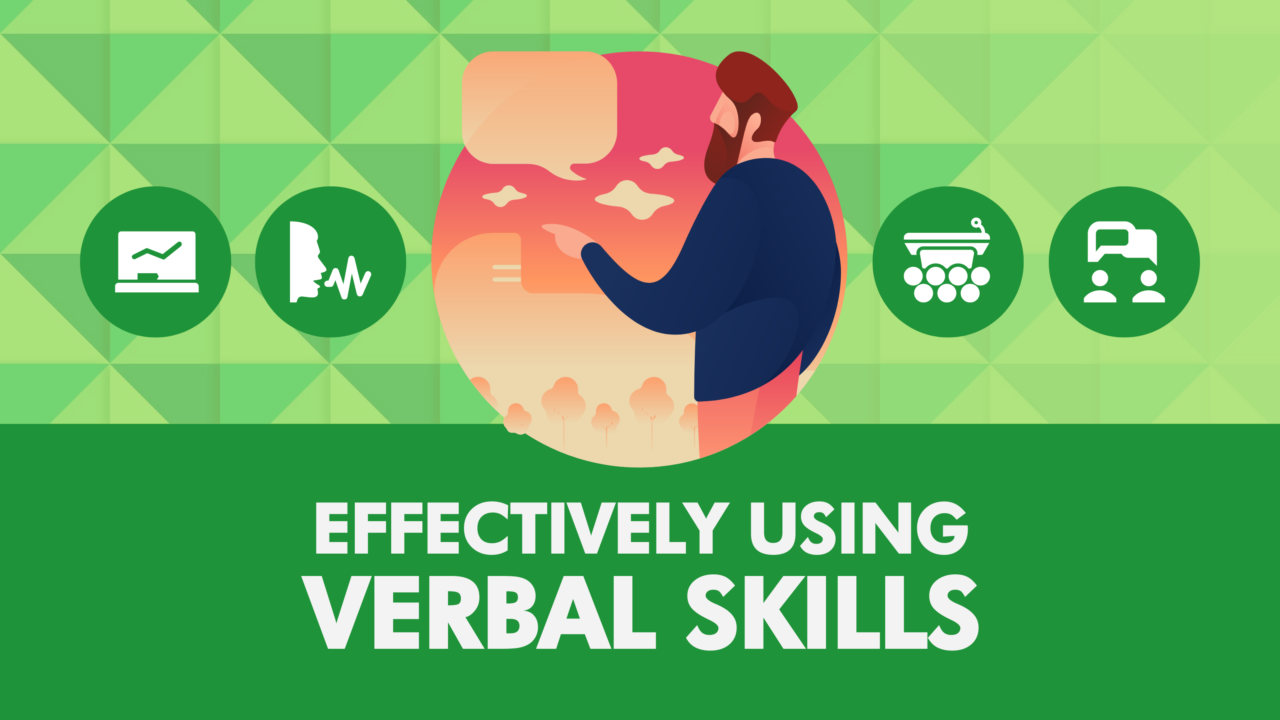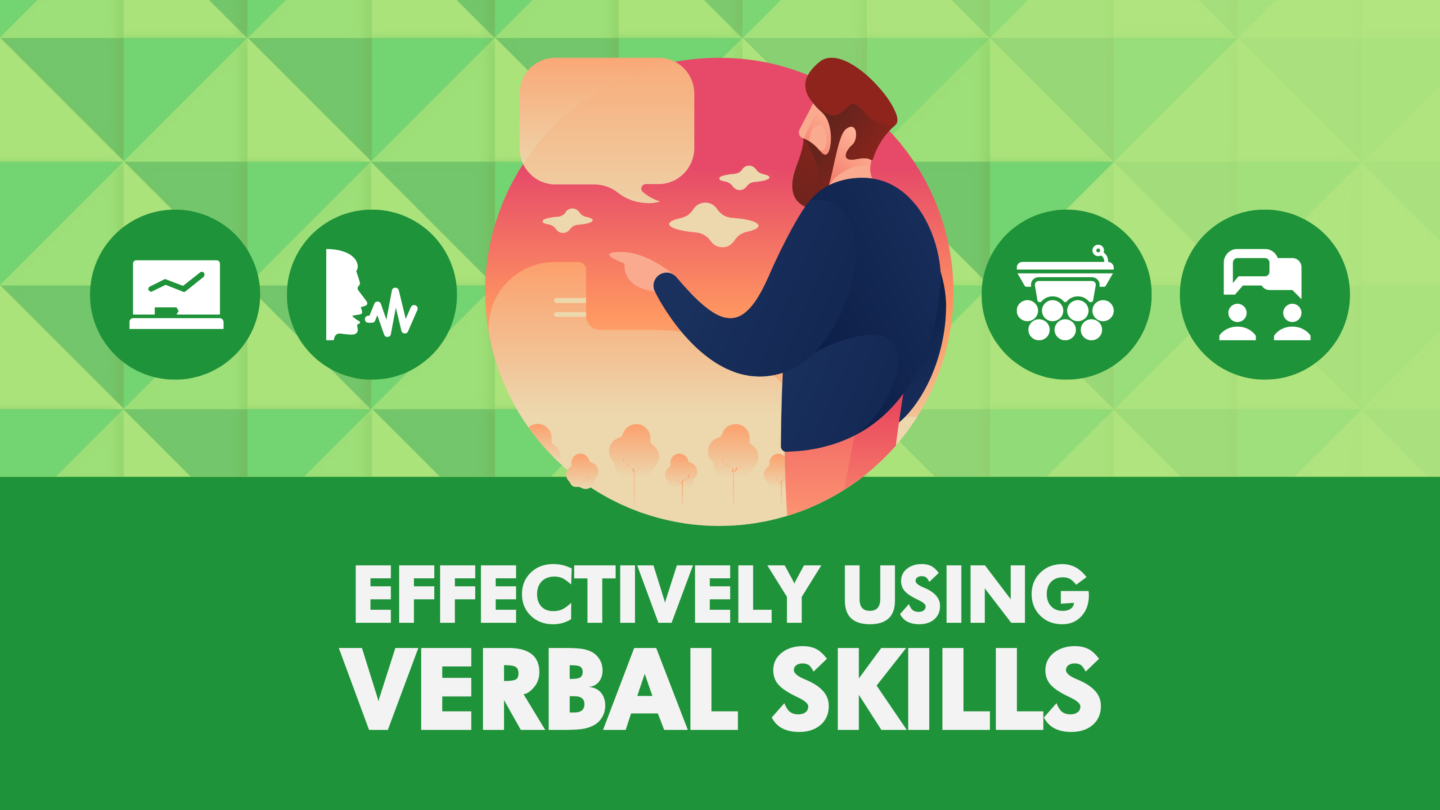
Effectively Using Verbal Skills
What are verbal skills?
While the obvious definition for verbal skills would in part require “talking”, they’re actually comprised of much more than that. Let’s take a closer look at what verbal skills actually encompass.
Communication is essentially considered a soft skill – that is, it is difficult to measure and quantify. Someone’s verbal skills dictate how they deliver messages, how clearly they can convey information, how they interpret information and act on it accordingly, and more. Verbal communication is present in many different contexts and will change depending on which individuals or groups are involved. It also depends on the situation, as different verbal skills are required in a training session, versus a one-on-one, versus terminating an employee, for example.
Why are verbal skills important?
One of the most critical skills employers look for when hiring new employees is strength in the verbal skills area. But why?
The fact is, well developed verbal skills are a necessity in most workplaces. Without them, an employee can be placed at great disadvantage including the compromise to managing relationships effectively (peers, colleagues, direct reports) and risk by providing an unclear set of instructions or directives.
While some individuals may out-perform others in having a firm grasp and usage of effective verbal skills, it is something that can be developed. Here are some general tips for establishing strong verbal skills.
- Be approachable – the more open and encouraging you seem when addressing others, the more likely people will feel comfortable listening and responding to you.
- Be thoughtful – think before you speak, ask clarifying questions but don’t offer an opinion without full clarity.
- Demonstrate judgment – no one likes it when someone else dominates the entire conversation; allow others to contribute to a discussion
- Be humble and respectful – be mindful of other people, listen intently and offer insights where appropriate.
- Demonstrate confidence – speak clearly and concisely presenting facts and well-researched perspectives
- Listen! – while technically a non-verbal skill, listening is an essential aspect of communications that enables effective verbal skill usage.
As mentioned above, different positions at a company will require different levels of verbal skills. Here are some examples you would expect a certain position to possess:
Supervisor
- Advising others
- Giving constructive feedback
- Disciplining employees in a respectful manner
- Recognizing good work
- Remaining calm in stressful situations
- Training employees
- Terminating employees
Team members
- Giving information clearly and concisely
- Asking for assistance
- Posing questions to get more information
- Accepting criticism without getting upset
- Requesting feedback
Those with client interactions
- Asking for clarification
- Asking open-ended questions
- Communicating with angry customers
- Explaining the benefits of service/product
- Resolving conflicts
Presenters
- Speaking very clearly
- Clearly defining the focus of the discussion at the beginning
- Speaking so that everyone in the room can hear you
- Providing examples of the points you make
- Reiterating important points throughout the presentation
- Maintaining a good pace of delivering content to keep the audience engaged
- Speaking with confidence, but also humility
- Writing presentations for specific audiences
- Engaging with the audience through stories and humor

How to improve your verbal skills
Verbal skills are similar to any other skill being developed – the more you practice them, the better you’ll become. The best way to do that is to identify what specific verbal skills are best leveraged in your current position.
Are you a supervisor in charge of new employees?
Since much of your verbal communication will be training and knowledge transfer, practice verbal skills that correlate with these requirements. Knowing how to explain clearly how something works using concise language is essential, as would giving effective feedback.
Perhaps you’re a presenter?
Know your content and know your audience. Practice the presentation to ensure you are enunciating clearly, and are projecting appropriately.
Or maybe you’re a worker who has been assigned to a group project with people you don’t know very well. What verbal skills would work best here?
Being able to state your ideas while being open to other opinions is key. Encouraging other group members to participate and offer their insight, asking broad questions to figure out details for your project, requesting feedback from a supervisor – all of these are important verbal skills that you may have to use.
Once you’ve identified which verbal skills you use most often, create a development plan that addresses any gaps.
Final thoughts
A strong set of verbal skills will serve you well in both your professional and personal life. Ensure you’re focusing on improving these skills continuously and be self-monitoring with when and where the best circumstances are in which to apply these skills.




